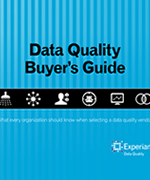- Products

Enjoy a free 30-day trial of our
data validation software.Experience the power of trusted data
solutions today, no credit card required! - Solutions

Enjoy a free 30-day trial of our
data validation software.Experience the power of trusted data
solutions today, no credit card required! - Partners

Enjoy a free 30-day trial of our
data validation software.Experience the power of trusted data
solutions today, no credit card required! - Learn more
- Pricing
- Contact Us
Top 5 questions for data quality vendors

Many of us today are in the market for data quality solutions. In fact, 89 percent of companies are planning to invest in some sort of data quality solution in the next year, with an average of a half a million dollars in budget. But, some companies are already spending much more. Thirteen percent are spending between two and five million dollars and seven percent are spending over five million dollars.
This high degree of investment is not something that should be taken lightly. Companies need to be sure they are working with the right vendors and selecting solutions that can have a material impact on the quality of data and show a return on investment.
Therefore, before you purchase any data quality software, there are five essential questions you need to ask a vendor.
- How do you prevent human error?
Human error is the leading cause of data quality errors and contributes to the belief that on average, a quarter of data in a database is inaccurate. If the vendor cannot prevent bad data from entering your system, poor quality information will inevitably propagate into business processes.
You want to look for a vendor that can help you maintain data over time, but also prevent human error. Expect a detailed response around what the solution does to prevent human error and check information to see if poor data has entered the system.
- How do your solutions maintain performance and scale?
While you many only have a small volume of data today, your business will hopefully grow and the way you use data will certainly change. A large volume of data could need to be processed before you know it. While understanding how solutions perform against accuracy and speed for your data needs today is important, knowing how that performance is maintained with increased volumes can be even more so.
Talk to vendors about the volume of data you have today as well as volumes that are much larger. Look for vendors that can handle not only your volume of data today, but can describe how to scale those solutions to larger enterprise businesses.
- What are your support hours, response times and escalation procedures?
Support is an extremely important part of selecting any data quality tool. If and when a problem does arise with your solution, you want to be able to speak with a vendor quickly, without being put out of production.
Vendors should have support hours for you and service-level agreements. You can also ask for detailed escalation procedures so you can understand if the vendor is going to provide you with the best service possible.
- Can you assist in providing a return on investment?
Showing a return on investment is essential to demonstrating value in data quality solutions, but also the data asset itself. Today, 79 percent of companies say they achieve a return on investment from data quality tools, but not all measure that on an annual basis.
Look for a vendor that can help you demonstrate a return on investment for their solution. They should suggest metrics to calculate before and after implementation based on your business needs. In addition, look for reporting tools if you are leveraging a self-service environment.
- What type of security and privacy practices are in place?
When purchasing software, platform security should be high on you organization’s agenda. It is important to be confident that the solution will perform to the expected level, but also that the solution is safe and secure.
Look for a vendor that has Organization of Standardization (ISO) 27001, which provides a model for establishing, implementing, operating, monitoring, reviewing, maintaining and improving an information security management system. Make sure security is a core part of how your vendor operates.
Making sure you are working with a strong data quality vendor is extremely important when putting technology in place and there are certainly many more questions you could ask.
Check out our data quality buyer’s guide for additional information about choosing the tools that are best suited for your organization’s data quality strategy.
- Why quality tools are needed
- How to definine a custom data quality strategy
- Ways to identify the best solutions

